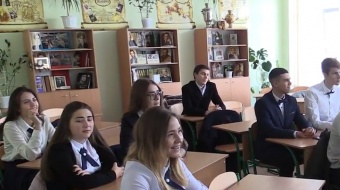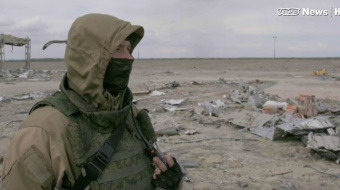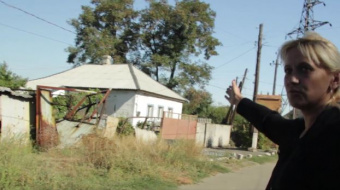Internally displaced persons from Donbas, don’t disturb us! Part 3
Internally displaced persons from Donbas, don’t disturb us! Part 3
- Hello, are dancers still needed?
- Yes. How old are you?
- I’m 25.
- Do you have work experience?
- No.
- That’s okay, we’re teaching. Are you from Kyiv?
- No, I came from Donetsk. Just wanted to know whether that’s okay…
- No, we have a problem with that, sorry.
- What you’re saying is you don’t hire people from Donetsk?
- No, I’m very sorry.
Internally displaced persons from Donbas, don’t disturb us! Part 1
Internally displaced persons from Donbas, don’t disturb us! Part 2
Left alone with their problems
Olha Yevlanova, trainer of Psychological Crisis Service, explains that negative stories about IDPs are spreading in a fast way because they involve basic instincts.
“It is not typical of people to concentrate on moments of happiness because they do not threaten their lives. Unpleasant things are closer as everyone expects to avoid them”, says psychotherapist. “A lot of people expect that, when they have the label of an IDP, they protect themselves that way”.
Volunteer Lesya Litvinova has her own vision of the problem. She thinks that it is easier to find the grounds to refuse IDPs than to find strength to accept them.
Those who want to help IDPs expect to see unhappy people who are very grateful. They expect to see a young mom with a baby – everything should be beautiful. In reality, those who leave the ATO zone are different people. In Kyiv too, different people live”, says a Frolivska Center cofounder.
“Get out of your home and look around. You may meet a lot of people who do not like the government. If, for example, your neighbor, an old lady, says something unpleasant about Poroshenko, you may agree with her. If IDPs from the Donbas say the same, you think they are separatists”, says Litvinova.
A volunteer from Frolivska is getting aid for the victims in the east of Ukraine.
Photo: Dmytro Larin.
The reason why people left the Donbas also influences the attitude to them.
“Those who come from the Crimea are the people who we are glad to see – activists, journalists, teachers of Ukrainian. They are those who do not want to live in Russia. The situation is different with the Donbas. People from the ATO zone are simply trying to save their lives. And they do not always look like textbook refugees: in national clothes – vyshyvankas, speaking Ukrainian, and suffering”, says human rights activist Oleksandra Dvoretska.
Activists with an ideal image of a Donbas IDP in the head are disappointed when they get in contact with reality. They cannot understand why IDPs refuse to take things which they do not need or they refuse to move to a house in a village because they do not have skills required for the life there.
It often happens that people, just to be proud of their own generosity, bring volunteers the stuff which cannot be used: something very dirty, hygiene tampons together with toys for kids or a falloimitator.
They bring the stuff to IDPs instead of throwing it away, and react negatively when IDPs refuse to take what was brought.
The IDPs’ adaptation is getting more complicated as volunteers put the responsibility for IDPs on themselves, and IDPs have no time to adjust to new conditions by themselves. It mostly refers to the places where there are a lot of IDPs living together.
Activists complain some IDPs have been living in sanatoriums for almost two years and have got accustomed that their problems are being solved and what they need is brought to them. Volunteers call that “artificial disability”.
“Now we stop serving the people who we have been served for a year and longer, and the people who are from the places in the ATO zones liberated from separatists”, says Lesya Litvinova. “We don’t refuse to help when something extraordinary and seriously happens. The majority of people understand us, and scandals and misunderstanding are an exception".
Experienced volunteers and psychologists stress that any help should be reasonable. Besides, they are convinced that residents of occupied regions have gone through events that traumatized their minds. Those people lost their dearest, their homes, their usual environment. That is why, and it is very important, relations with them should be built on sincerity and tolerance.
Aid Center for IDPs in Frolivska Street in Kyiv. Photo: Dmytro Larin
“It is no good to reflect on elaborating your behaviour with IDPs. One should just talk to them, ask them what way is more comfortable for them. One should not manipulate them – they should have choice”, says psychotherapist Olha Yevlanova.
Almost two years have passed since the time when millions of Ukrainians started leaving their homes, at the beginning, due to occupation and war, then because of difficult living conditions and unemployment. And even up to this time, the state has not made a decision what to do with them.
Politicians who are so fond of recording their video addresses to people have not spoken to IDPs; no politician has explained to them where to go, what to expect and to hope for.
At new places people feel loneliness. They feel that they are not needed. However, they cannot go back – for those who stayed in occupation and the ATO zone they are traitors. And IDPs are disappointed too as they know very well real traitors, those who asked occupants to come to their towns and villages.
Oleksandra Hayvoronska, pravda.com.ua
New service "Explain Ukraine". This is a daily mailout of three articles which were written about the situation in the Donbas by Donbas journalists and translated into English. Honest vision of people who work in the field is unbiased and fresh which is crucial in the world which is full of desinformation and propaganda. We try to share this vision in out daily mailout. You can subscribe here.














